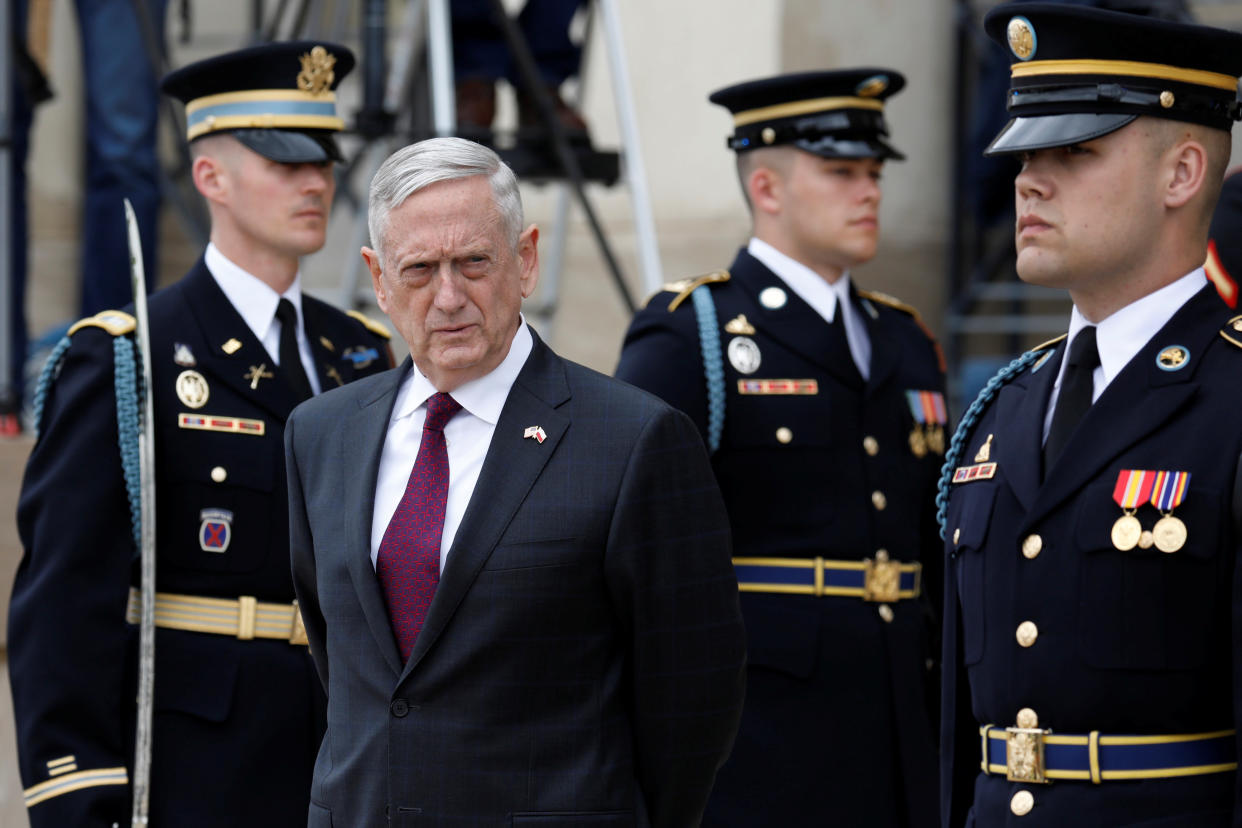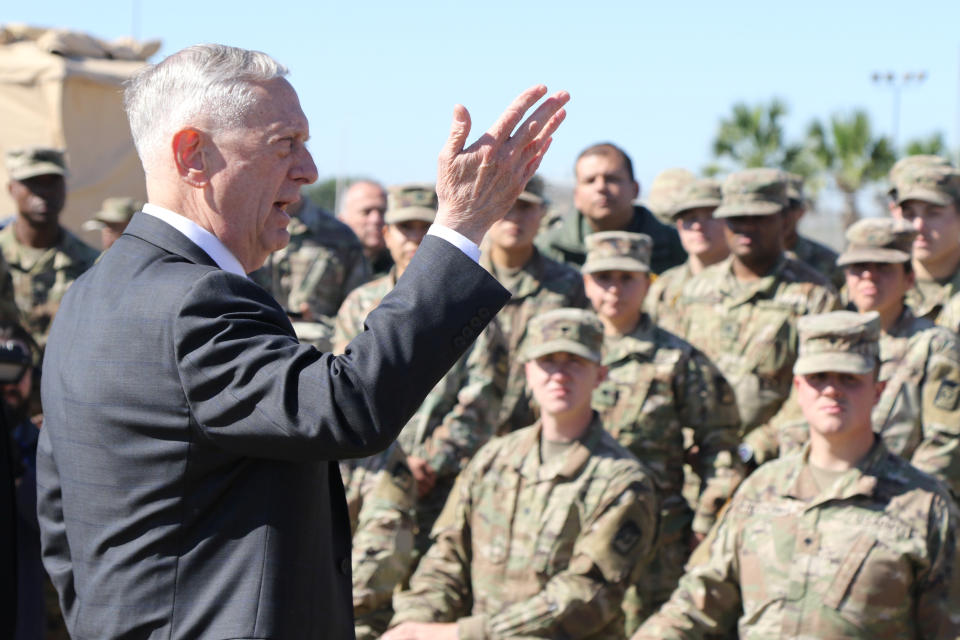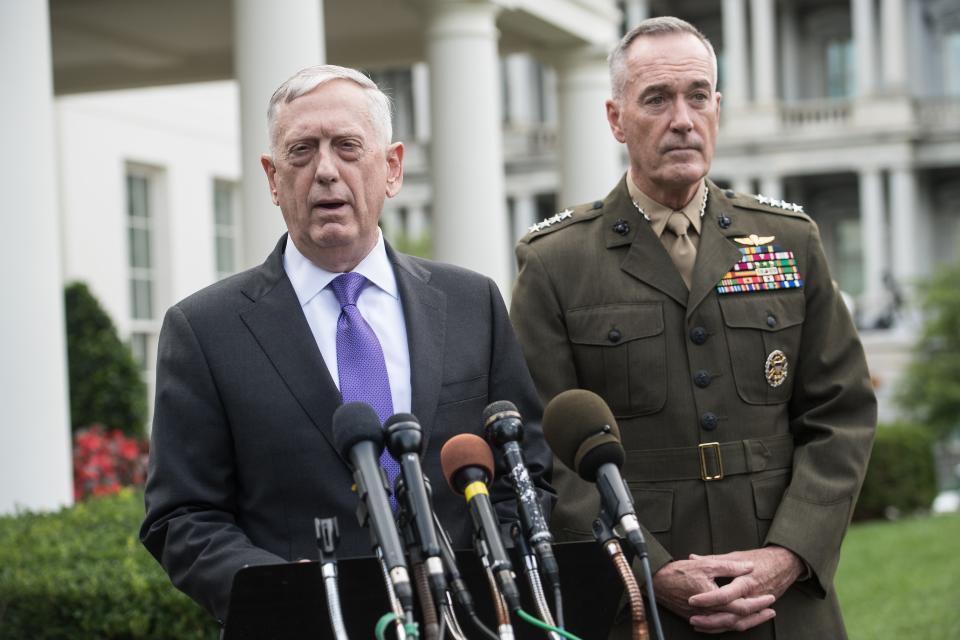The generals wonder: What took Mattis so long — and what happens now?

Pentagon-watchers have long wondered how long Secretary of Defense Jim Mattis could effectively fend off President’s Trump’s assault on America’s global leadership and network of alliances. A retired four-star Marine general, combat veteran and military historian, Mattis managed slow-walking retreats in the face of Trump’s transgender ban in the military, unnecessary “Space Force,” and the morale-sapping deployment of thousands of armed U.S. troops to the southern border to repel a ragtag caravan of migrants. Each time Trump publicly insulted and disrespected allies, Mattis dutifully countered with charm offensives to soothe their nerves.
Yet this week, when Trump decided to ignore the advice of top advisers and order the surprise withdrawal of all U.S. troops from Syria and roughly half of the 14,000 troops deployed to Afghanistan, Mattis found himself on ground from which there was no principled retreat. These orders went far beyond provocative tweets, political posturing at the southern border or self-aggrandizing requests for a military parade. Rather, Trump was reversing strategic policy in combat theaters with life-or-death consequences for close partners. And the commander-in-chief was doing so unilaterally, against Mattis’s advice and with little consultation or preparation with the U.S. military chain of command, causing potential havoc in the field. That helps explain why Trump’s tweet was met with a letter of resignation from Mattis.
“I’m not really surprised by Mattis’s resignation because I have actually been wondering what was taking him so long, but I do believe that the way President Trump made the decision and the implications for maintaining trust in our critical alliances around the world were even more important than the Syria withdrawal itself,” said retired Gen. Mark Hertling, former commander of U.S. Army Europe and a veteran of combat in Iraq. It has been reported that Chairman of the Joint Chiefs Joseph Dunford and Gen. Joseph Votel, commander of the U.S. Central Command, were out of the loop in the decision making and thus had no time to prepare for an orderly withdrawal.
“That means Gen. Votel’s staff probably got the word at the same time as everyone else in the country, and right now they and the troops in the field are facing a very short withdrawal timeline and wondering WTF?,” said Hertling. “Imagine you are a young Special Forces captain or sergeant in Syria advising our Kurdish partners, and suddenly the Kurds who’ve been fighting alongside you against the Islamic State hear the news that U.S. forces will abandon them within a month. That’s a very uncomfortable position to be in.”
Hertling speaks from experience about being blindsided in the field by a poorly vetted change in U.S. policy. In the early days after the Iraq invasion, he was an assistant division commander speaking in an auditorium in Baghdad to roughly 600 senior officers from the defeated Iraqi army, hoping to incorporate them into efforts to stabilize the country. In the midst of the talk, news broke that Coalition Provisional Authority head L. Paul Bremer had just disbanded the Iraqi army and launched a “de-Baathification” campaign targeting the Baath Party officer corps without preparing the U.S. chain of command.
“I’m standing there, and suddenly a rumbling starts in the crowd as the news spreads through the audience that I haven’t even heard yet,” Hertling recalled, noting that those orders were the origin of years of bloody civil war. “My reaction was, ‘You have got to be kidding me! Now what am I supposed to tell these officers who suddenly have no jobs or livelihood?’”

Similar “WTF” reactions may be echoing today among troops and advisers in Syria and Afghanistan and in allied capitals around the world. “I’m also getting a lot of messages from my former European colleagues who are very concerned,” said Hertling, “because Mattis was the person always sweeping up behind Trump’s disruptive visits to NATO, trying to keep the alliance strong.”
President Trump likes to tout his respect for the U.S. military, as evidenced by his significant increase in defense spending. But there is a fundamental disconnect between Trump’s instinctive unilateralism and transactional approach to allies, on one hand, and the U.S. military’s core belief in alliances as force multipliers and the foundation for America’s superpower status on the other. Trump’s obvious affinity for autocrats and dictators also cuts against the grain of the U.S. military ethos.
Not only was the future credibility of U.S. commitments and alliances at stake in this week’s White House decision, but the orders also revealed a president willing to wield U.S. military power essentially alone and unencumbered by an institutional decision-making process and without close consultation with the military chain of command. For Mattis, the implications of such a freewheeling approach to geopolitics by an increasingly unconstrained commander-in-chief were apparently too much.
“One core belief I have always held is that our strength as a nation is inextricably linked to the strength of our unique and comprehensive system of alliances and partnerships,” Mattis wrote in an extraordinary resignation letter that he purposely had widely disseminated. Similarly, he wrote that the United States must be “resolute and unambiguous” in confronting adversaries such as Russia and China that “want to shape a world consistent with their authoritarian model.” He continued: “Because you have the right to have a Secretary of Defense whose views are better aligned with yours on these and other subjects, I believe it is right for me to step down from my position.”
William Cohen is a former secretary of defense and Republican senator from Maine. “Jim Mattis has been grinding his teeth for a long time over Trump’s decisions, like sending troops to the southern border for purely political reasons and canceling U.S. military exercises in South Korea, but I think he felt Trump’s unilateral decision on troop withdrawals was a fundamental betrayal of our allies in the fight against the Islamic State,” Cohen said in an interview. “I don’t think Mattis felt he could be complicit in such a decision — taken without adequate consultations with our allies or even our own military — and still keep faith with U.S. troops. So Mattis resigned, and I applaud him for it.”
Mattis’s resignation after two years brings to a close the era of “Trump’s generals,” when the mercurial businessman — the first person ever to serve as president without any experience in government or the military — surrounded himself with a coterie of senior officers and combat veterans with decades of experience in national security and international affairs. That group included former national security adviser and retired Army Lt. Gen. H.R. McMaster; White House chief of staff and retired four-star Marine Gen. John Kelly; Mattis, and Joint Chiefs Chairman Dunford, another Marine four-star general. Together they were seen as adding experience, discipline and stability in guiding a White House sorely lacking in all of those attributes.

Earlier this year McMaster was forced out, and the White House has announced that Kelly and now Mattis will follow. Trump unnecessarily made Dunford a lame duck by announcing his replacement many months before he is due to retire next summer. In naming hard-line nationalists John Bolton and Mike Pompeo as his national security adviser and secretary of state, respectively, Trump has found senior advisers more aligned with his own nationalist and unilateralist views.
Increasingly sure of his own “America First” instincts and free of the impediments of cautious advisers, Trump showed with this week’s surprise troop withdrawal decisions that he feels free to ignore the advice even of more hard-line aides, testing the premise put forward in his campaign that “I alone can fix it.”
“For Trump’s first two years, he had in close proximity advisers who had devoted their lives to the security of the United States, were loyal to the constitution and U.S. institutions rather than to Trump personally, and who provided a break on the president’s worst impulses. And Trump punished them for it,” said John Nagl, a retired Army lieutenant colonel and combat veteran, and former president of the Center for a New American Security. “Now the generals are all but gone, and they are being replaced by ideologues who have no conception of the cost of war or the worth of allies, and that likely includes whoever the president choses to replace Mattis. I find that terrifying,”
The decision to withdraw troops precipitously from Syria and dramatically cut troop levels in Afghanistan, Nagl believes, will expose many U.S. allies in those places to almost certain death, and it will increase instability and breathing space for extremists in the Islamic State group and al-Qaida. “The fact that [Russian President Vladimir] Putin publicly praised the withdrawal decisions, and Mattis resigned over them,” he said, “should tell you all you need to know about where America’s true interests lie.”
Retired Gen. Barry McCaffrey is a decorated combat veteran and the former four-star commander of U.S. Southern Command. He believes the fact that Trump now feels empowered to circumvent the military chain of command and ignore the collective advice of his top aides, and to act on impulse in matters of war and peace, raises the prospect that he could do “real, irreversible” harm to U.S. national security interests over the next two years.
“President Trump has expressed his ‘love’ for North Korean dictator Kim Jong Un, arguably the cruelest dictator on earth. He has cozied up to a murderous thug in [Philippines President Rodrigo] Duterte. And he has only praise for a thuggish adversary and autocrat in Vladimir Putin. All that bizarre behavior sends a message to our traditional democratic allies that you can no longer trust the United States,” said McCaffrey. “So I think Secretary Mattis concluded that he could no longer in good conscience be associated with this behavior from his commander-in-chief, and his letter of resignation was a great gift to the American people. It reminds us how an ethical public servant acts. The question now is whether Congress will take note and reassert its Article 1 powers to check a president who is putting us in danger.”
James Kitfield is a senior fellow at the Center for the Study of the Presidency and Congress.
_____
Read more from Yahoo News:

